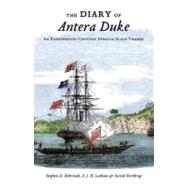The Diary of Antera Duke, an Eighteenth-Century African Slave Trader
, by Behrendt, Stephen D.; Latham, A.J.H.; Northrup, David- ISBN: 9780195376180 | 0195376188
- Cover: Hardcover
- Copyright: 3/8/2010
The diary of Antera Duke is one of the earliest and most extensive surviving documents written by an African residing in coastal West Africa predating the arrival of British missionaries and officials in the mid-19th century. Antera Duke (ca.1735-ca.1809) was a leader and merchant in late eighteenth-century Old Calabar, a cluster of Efik-speaking communities in the Cross River region. He resided in Duke Town, forty miles from the Atlantic Ocean in modern-day southeast Nigeria. His diary, written in trade English from 18 January 1785 to 31 January 1788, is a candid account of daily life in an African community during a period of great historical interest. Written by a major African merchant at the height of Calabar's overseas commerce, it provides valuable information on Old Calabar's economic activity both with other African businessmen and with European ship captains who arrived to trade for slaves, produce and provisions. It is also unique in chronicling the day-to-day social and cultural life of a vibrant African community. Antera Duke's diary is much more than a historical curiosity; it is the voice of a leading African-Atlantic merchant who lived during an age of expanding cross-cultural trade. The book reproduces the original diary of Antera Duke, as transcribed by a Scottish missionary, Arthur W. Wilkie, ca. 1907 and published by OUP in 1956. A new rendering of the diary into standard English appears on facing pages, and the editors have advanced the annotation completed by anthropologist Donald Simmons in 1954 by editing 71 and adding 158 footnotes. The updated reference information incorporates new primary and secondary source material on Old Calabar, and notes where their editorial decisions differ from those made by Wilkie and Simmons. Chapters 1 and 2 detail the eighteenth-century Calabar slave and produce trades, emphasizing how personal relationships between British and Efik merchants formed the nexus of trade at Old Calabar. To build a picture of Old Calabar's regional trading networks, Chapter 3 draws upon information contained in Antera Duke's diary, other contemporary sources, and shipping records from the 1820s. Chapter 4 places information in Antera Duke's diary in the context of eighteenth-century Old Calabar political, social and religious history, charting how Duke Town eclipsed Old Town and Creek Town through military power, lineage strength and commercial acumen.







